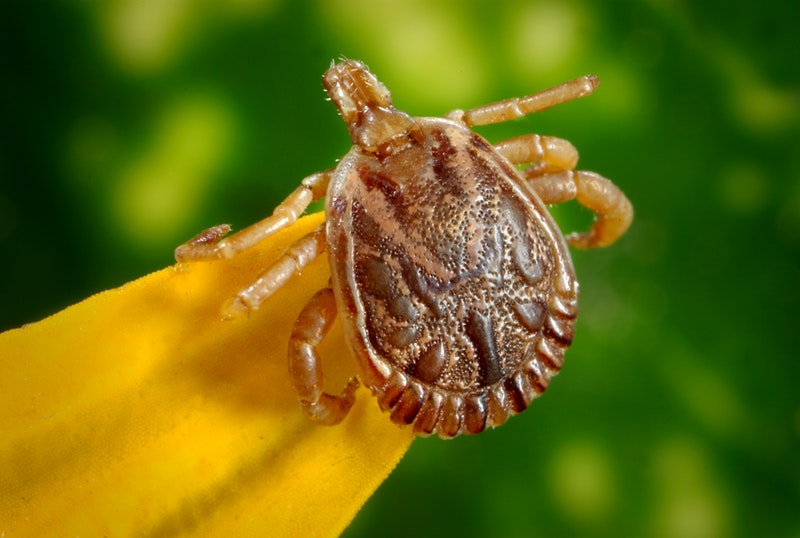How To Enjoy A Tick-Free Zone With Your Cat?
This page contains affiliate links. We may earn money or products from the companies mentioned in this post through our independently chosen links, which earn us a commission. Learn More

As a cat owner, you will agree that it takes more than adopting a cat and feeding it to keep it healthy and happy. Even though our four-legged best friends groom themselves the best way they know how to, they still need us to care for them, and prevent any blood-sucking pests from disrupting their peace and infecting them with diseases.
So, if you are looking for ways to enjoy a tick-free zone or home with your cat, you are just in the right place. Living in a tick-free environment, especially when you have pets, can be an uphill task, but it is achievable. But first, you need to know what ticks are and how it affects the health of your cats.
What Are Ticks?

Ticks are egg-shaped blood-sucking pests; they look like spiders and vary in size from about one millimeter to one centimeter long. Furthermore, you need to be extra careful if you are living in woodland, heath, and grassland areas; these are places ticks are prevalent.
Also, they can be found in gardens, especially when you are in an environment with a lot of wildlife. For instance, if you live close to areas where there are a lot of hedgehogs, rabbits, or even sheep and deer, the chances of your cats getting ticks are high.
In addition, ticks are active all through the year, but they are likely to infest your environment in spring and autumn. Fortunately, ticks do not fly or jump like fleas, but they can drop or simply climb your cat’s coat during a walk in the park or any place ticks are sitting in.
How To Know If Your Cat Has A Tick?

The good thing is, ticks are big enough to spot; by merely running your hands over your cat’s body, you can feel lumps or bumps, which a tick infestation feels like. You can check your cat’s head, ear, feet, or neck for ticks because they attach themselves to such areas.
For a quick fix, you can brush your cat’s coat to remove them. Don’t forget that ticks vary in sizes; from 1mm to 1cm long, it depends on their age. In essence, the bigger the tick, the older it; ticks tend to enlarge as they fill themselves with blood.
The sad part is, ticks are vectors, they carry diseases like Lyme disease, and so it is important to detach the tick carefully to reduce the chances of the disease entering the system. However, squeezing the tick from your cat’s body can cause it to expel blood back into your cat, which may lead to infection.
Nonetheless, pet shops sell handy tick-removal tools to make it easy for you. Please, ask your local vet before purchasing these devices from the pet shops.
Why We Must Protect Our Cats?

Ticks, as implied earlier, can pass on infections from one animal to another; they feed by biting an animal and feasting on blood. Once they are filled, they drop off; if you see swollen ticks around your property, it means they’ve infested your pet, feed off of it, and then left. This could mean there are more.
Furthermore, ticks transmit microbes, which cause diseases like babesiosis, and Lyme, though it is more likely for dogs to get infected than cats, we should try our best to live tick-free home with our cats.
Lyme disease is a bacterial infection that comes with tick infestation; some of the symptoms may include loss of appetite, lethargic, some may become lame, have stiff joints, or feel sore. Fortunately, it can be treated with antibiotics.
It is highly advisable to use a tick treatment that can kill ticks; spot-on treatments and collars are accessible. Ask your vet for the right prescriptions. Follow instructions because some medications are meant for dogs only and can be detrimental when used on cats. So ask your vet which is safe for both dogs and cats if you need to treat both pets. Also, contact your local pest exterminators to inspect your property and help you get rid of ticks professionally without causing harm to your pests.
How Do We Get Rid Of Ticks?

Now that we know what ticks are and the effect they have on our cats, how do we prevent them from homes? The next stage of this article will show you easy yet effective ways to get rid of ticks from your home.
Groom your long-haired cats: ticks like any other pests do not want to be seen by us. They tend to hide in a conducive environment like dark places, and your fluffy, long-haired cats provide such an environment; they make it easy for ticks to hitch a ride and make it their home. Give your cat a short summer clip, not too short to prevent sunburn. However, if you do not want to trim your cat’s coat for the summer, it is best you keep them indoors or a confined outdoor area where there is no high grass and weedy spots. In addition, do a thorough tick check before you bring your cat indoors.
Trim the grass: ticks prefer to live in weedy, tall grass, and shrubs areas where they can hitch a ride on pets, and people as they brush past. To prevent ticks in your yard, keep it well mowed, and if you owe a garden, keep the weeds down as much as possible, and maintain space between shrubs and perennials. It will help you cut down on the number of places for ticks to hide. Moreover, it makes it easy for your pets to walk through the garden without brushing against the plants.
Food-grade diatomaceous earth: Another effective way to get rid of ticks and other pests from your yard is by spraying food-grade diatomaceous earth in the yard. D.E dehydrates insects, which can help you get rid of unwanted insects lurking in your garden or yard.
Routine inspections: Sometimes, these pesky pests find their way into our properties no matter how hard we try to prevent them. It is advisable to contact your local pest exterminators for routine inspections and to kill bugs for good, especially when you have a yard, garden, and pets. It helps to ward off unwanted visitors and allows you to enjoy a tick-free zone with your cats.




